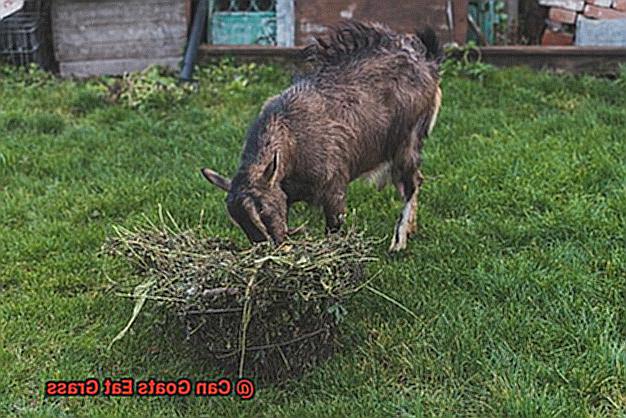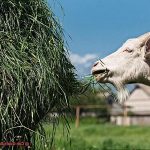Calling all animal enthusiasts. Have you ever stopped to ponder what goats munch on? You might be surprised to discover that these natural foragers have a diverse palate, ranging from leafy greens and bushes to fruits and veggies. But what about the classic image of goats grazing on lush green grass? Can they really eat it?
The answer is a resounding yes. Grass is a staple in many goat diets, especially for those raised in rural settings or farms. It’s packed with essential nutrients like fiber, protein, and vitamins that are vital for maintaining good health in these charming creatures.
However, while goats can consume grass without any issues, it’s important to ensure that they have access to other foods as well. A diet solely consisting of grass may lack certain nutrients needed for optimal health, and overconsumption can lead to weight gain. During the growing season, it’s crucial to monitor their grass intake carefully since overgrazing can cause pasture quality to decrease and potential health issues for the goats.
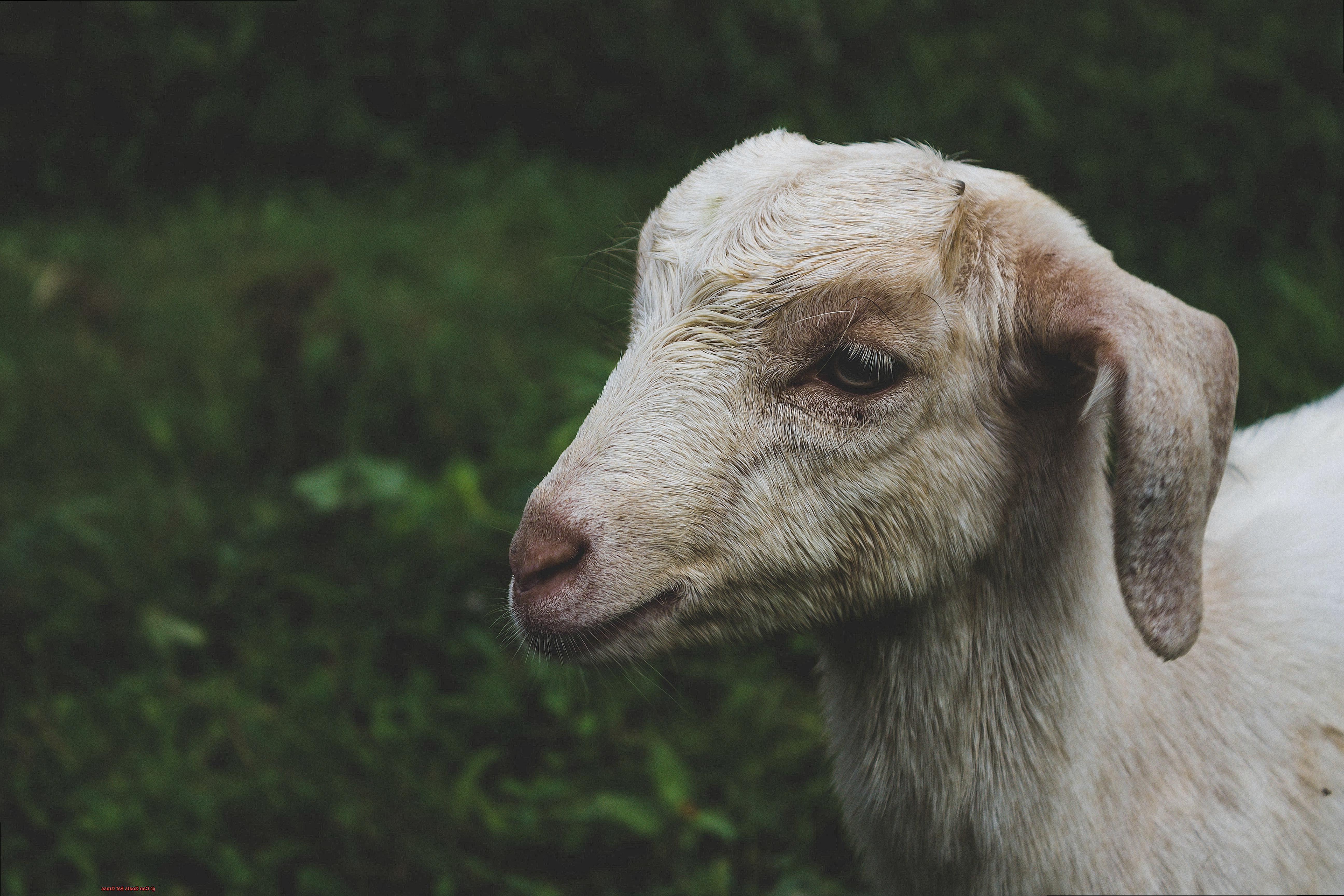
So, there you have it- goats can indeed eat grass but providing them with a balanced diet is crucial for their overall well-being.
Keep reading.
What is Grass?
Contents
Grass is a plant that belongs to the family Poaceae, one of the largest and most diverse families of flowering plants. It is a ubiquitous plant that can be found in various habitats and is widely used for grazing livestock, including goats.
Grass plays a crucial role in a goat’s diet as it provides essential nutrients needed for growth and development. These nutrients include fiber, carbohydrates, protein, calcium, and phosphorus. These nutrients are essential for building strong bones, healthy muscles, and maintaining overall good health. Grass also provides goats with energy as the carbohydrates found in grass can be quickly digested.
While most varieties of grass are safe for goats to consume, some types may be toxic and cause health problems or even death. For example, Johnson grass or Sudan grass can be potentially harmful if not properly managed. Therefore, it’s important for goat owners to be aware of the types of grass that are safe for their goats to eat.
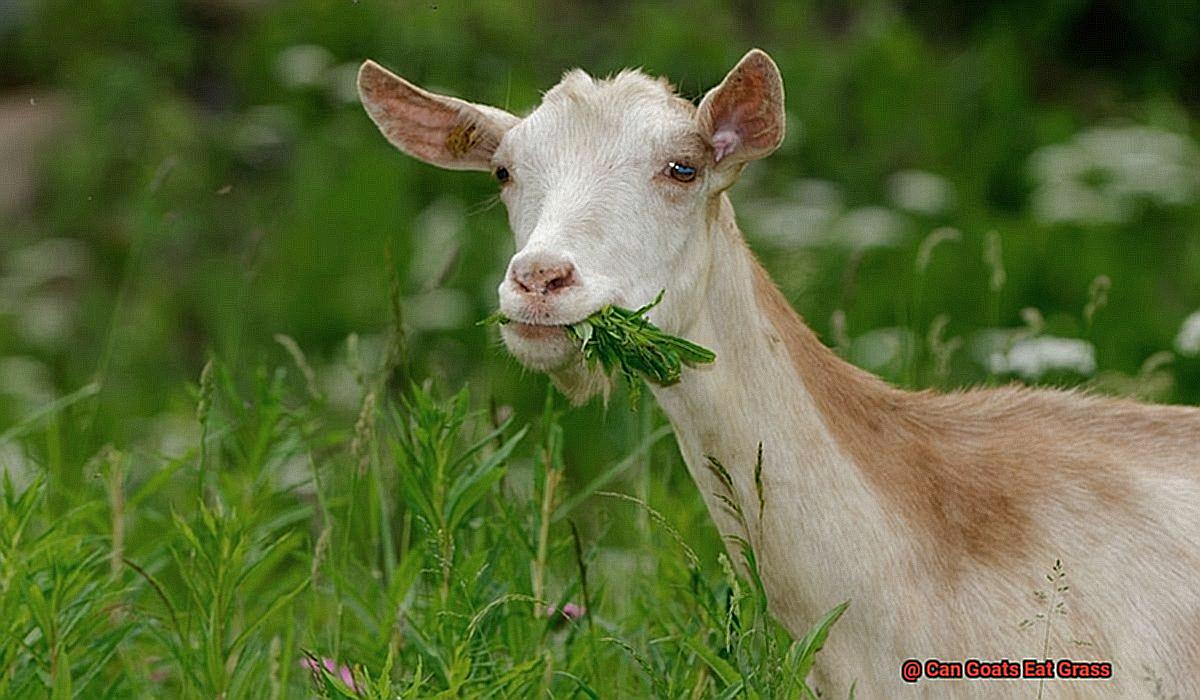
Quality is another crucial factor when it comes to grass for goats. High-quality grass with adequate protein content is recommended for optimal goat health. Young grass tends to be more nutritious than mature grass, while grass grown in fertile soil tends to be more nutrient-dense than grass grown in poor soil.
There are many different species of grass available for grazing, each with its unique characteristics and nutritional profile. Some common types of grass that are commonly found in pastures include Bermuda grass, fescue grass, and ryegrass. These grasses are all safe for goats to eat but may have different nutritional values depending on their species and growing conditions.
Access to fresh water is also crucial for goats as grazing on dry grass can cause dehydration. Therefore, goat owners should ensure their goats have access to clean water at all times.
In conclusion, grass is a crucial component of a goat’s diet as it provides essential nutrients needed for growth and development. As a responsible goat owner, it is important to be aware of any potentially harmful varieties and to provide your goats with access to high-quality grass and fresh water.
Types of Grass for Goats to Eat
One of the essential parts of their diet is grass. However, not all grasses are created equal. To help you give your goats the best nutrition possible, we have researched and compiled a list of the most beneficial types of grass for them to eat.
Timothy grass is the first choice for many goat owners. It’s high in fiber and low in protein, which makes it an ideal option for goats who need to maintain a healthy weight. Additionally, timothy grass is easy to digest and can keep a goat’s digestive system functioning properly.
Bermuda grass is another option that goats can eat. This grass is high in protein and can supply goats with the energy they need to stay active and healthy.
However, Bermuda grass can be tough and hard to digest, so it should be fed in moderation.
Clover is another excellent choice of grass for goats. It’s high in protein and can support a goat’s immune system. Moreover, clover is easy to digest and can help prevent bloating and other digestive issues.
Fescue grass is also an excellent option for goats. It’s high in fiber and can help maintain their digestive system’s proper function.
Additionally, fescue grass is easy to digest and can provide goats with the energy they need to stay active and healthy.
Potential Dangers of Eating Certain Types of Grass
Some types of grass can even be dangerous and lead to serious health issues for your furry friends.
One such type of grass is Johnson grass, which contains high levels of prussic acid. This toxic acid can cause cyanide poisoning in goats if they consume too much. The symptoms of cyanide poisoning include difficulty breathing, muscle tremors, and convulsions, which can be life-threatening for your goats.
Another dangerous grass for goats is fescue grass that has been infected with endophyte fungus. This fungus produces toxins that can cause reduced milk production and weight loss in goats. In severe cases, it can even cause gangrene in their extremities.
It’s also essential to note that herbicides or pesticides should never be used on any grass or plants that goats may consume. These chemicals can be harmful to goats and cause a range of health problems if ingested.
As a responsible goat owner, you must be vigilant about what your goats are eating and ensure they have access to safe and healthy food sources. Providing a variety of grasses like Timothy, Bermuda, and clover can maintain their health and wellbeing.
Quality and Nutritional Value of the Grass
After all, not all grasses are created equal, and selecting the right type of grass can make a significant difference in your goats’ overall health and well-being.
As ruminants, goats require a diet that is high in fiber and low in protein. When it comes to grasses suitable for goats, Bermuda grass, Timothy grass, Orchard grass, and Ryegrass are excellent options. These types of grass are packed with fiber and contain essential nutrients such as calcium and phosphorus for optimal goat health.
However, it’s not just about the type of grass you choose; the stage of growth of the grass is also crucial. Young, tender grass may be tempting for your goats, but it’s higher in protein and lower in fiber than mature grass. This can lead to digestive issues for your goats. Therefore, it’s best to feed them hay or mature grass rather than young shoots.
Moreover, you must ensure that the grass you feed your goats is free from harmful substances such as pesticides and herbicides. Goats are sensitive to these chemicals, which can result in illness or even death.
In conclusion, when it comes to feeding your goats, quality and nutritional value of the grass should never be overlooked. By choosing the right type of grass and ensuring it is free from harmful substances, you can help your goats stay healthy and thrive. So next time you’re deciding what to feed your goats, remember these key factors and choose wisely.
How Much Grass Should Goats Eat?
It’s a great question, and the answer is essential to maintaining your goats’ health and happiness.
Goats are natural grazers and love to munch on grass. However, it’s important not to overfeed them. As a general rule of thumb, goats should eat about 2-4% of their body weight in grass every day. But, please note that this is just an estimate and may vary depending on your goat’s individual needs.
To determine how much grass your goat needs, you first need to know their weight. You can use a livestock scale or estimate their weight based on their breed and age. Once you have their weight, you can calculate how much grass they should eat.
It’s crucial to spread out their feedings throughout the day and provide access to fresh water at all times. Young and tender grass is the preferred choice for goats, but they will also eat older grass if it’s available. However, older grass is less nutritious and may require goats to eat more to meet their nutritional needs.
In addition to grazing on grass, goats may also require supplemental feed such as hay, grains, and minerals depending on their individual needs. Consulting with a veterinarian or livestock nutritionist can help you determine the best diet for your goats.
Remember, the quality of the grass your goats are eating is crucial. Choosing the right type of grass and ensuring it is free from harmful substances is essential to keep your goats healthy and thriving. Feeding them young shoots or grass with pesticides can lead to digestive issues, illness, or even death.
Providing your goats with access to fresh grass and monitoring their intake is key to keeping them healthy and happy. With these tips in mind, you can give your goats the proper nutrition they need to thrive.
Benefits of Eating Grasses for Goats
Goats are fascinating creatures that have a natural appetite for grasses, making it an essential part of their diet. Eating grasses provides numerous health benefits for goats that can improve their overall well-being.
One of the most significant benefits of eating grasses for goats is its nutritional value. Grasses are packed with vital nutrients such as fiber, protein, and minerals that support goats’ growth and development. By consuming grasses, goats can maintain a healthy weight and support their immune system.
Moreover, grasses are rich in fiber, which is crucial for goats’ digestive health. Eating grasses can help prevent digestive issues like bloat and constipation. Chewing on grass also helps goats maintain healthy teeth and gums by naturally wearing down their teeth and preventing dental issues.
Eating grasses also encourages goats to exhibit their natural foraging behavior, which stimulates both their mental and physical health, making them happier and healthier. Foraging provides exercise that keeps goats active and prevents them from becoming overweight.
Lastly, providing your goats with access to fresh and nutritious grasses is a cost-effective option for goat owners. Grass is easily accessible and renewable, making it an environmentally friendly food source for goats.
Feeding your goats with fresh and nutritious grasses is crucial to support their growth and overall health.
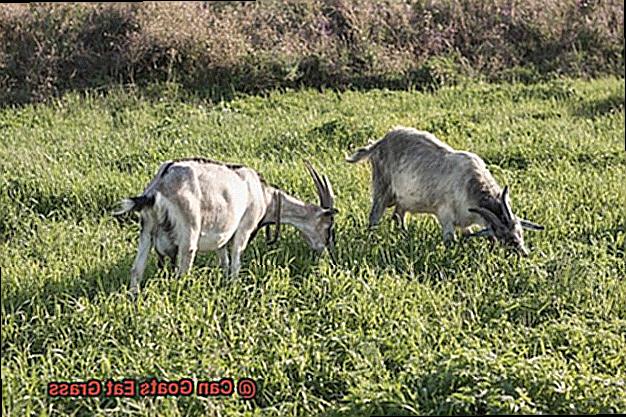
Other Food Sources for Goats Besides Grass
While grass is a great source of nutrition for goats, there are plenty of other food options available to them. Here are some alternative food sources for goats besides grass that you can consider.
Hay is an excellent source of fiber and one of the most common food sources for goats. It can be fed to goats throughout the year, especially during the winter months when fresh grass is scarce. Alfalfa hay is particularly high in protein and calcium, making it an excellent choice for pregnant and lactating does.
Goats are natural browsers and enjoy a variety of different plants. Browse refers to the leaves, twigs, and branches of trees and shrubs. Goats love to snack on leaves from trees such as mulberry, willow, and poplar, as well as blackberry bushes and grape vines. However, it’s crucial to ensure that any browse given to goats is not toxic, and they have access to fresh water at all times.
Supplemental feed such as grains and pellets can also benefit goats. However, it’s essential not to overfeed them with grains as this can lead to health issues such as bloating and diarrhea. Corn, oats, barley, and soybeans are all suitable options.
Lastly, goats require access to mineral supplements to ensure they get all the necessary nutrients for their health and wellbeing. Minerals such as calcium, phosphorus, and salt are particularly important for goats.
Providing a varied diet that includes hay, browse, grains, and minerals can help ensure that your goat maintains optimal health and wellbeing. So why not treat your goat to a diverse meal today?
Tips for Ensuring Goat Health When Eating Grass
However, it’s not enough to simply let them roam free in a pasture. You need to make sure the grass they are eating is healthy and nutritious. Here are five tips for ensuring your goat’s health when they are grazing on grass.
Keep Them Hydrated
Goats need access to clean, fresh water at all times, especially when grazing on dry grass. Make sure their water source is clean and regularly refilled so they can stay hydrated throughout the day.
Monitor the Quality of Grass
Goats are picky eaters and will avoid grass that doesn’t taste good or has low nutritional value. Avoid allowing them to graze on grass that has been treated with pesticides or herbicides, as this can be harmful to their health. Instead, choose high-quality grass that provides all the necessary nutrients for optimal goat health.
Provide a Balanced Diet
While grass is an important part of your goat’s diet, it may not provide all the necessary nutrients they need. Supplement their grazing with hay, grains, and other supplements as needed to ensure they get all the vitamins and minerals they require.
Watch Out for Poisonous Plants
Some plants can be toxic to goats, such as ragwort, hemlock, and buttercups. Make sure you know which plants are safe for your goats and remove any toxic plants from their grazing area immediately.
Rotate Pastures Regularly
Overgrazing can lead to soil erosion and reduce the quality of the grass your goats are eating. By rotating pastures, you give the grass time to regrow and prevent your goat from eating poor quality grass.
Ensuring your goats stay healthy while grazing on grass requires providing a balanced diet, monitoring the quality of grass they are eating, and rotating pastures regularly.
By following these tips, you can keep your goats healthy and happy as they munch on their favorite snack. Remember to always consult with a veterinarian before making any significant changes to your goat’s diet or living conditions.
Yrw3vIEE-kM” >
Conclusion
As we wrap up this discussion on whether goats can eat grass, the answer is a resounding yes. Grass is a vital component of their diet and provides them with essential nutrients such as fiber, protein, and vitamins that are crucial for their overall health and well-being.
However, it’s important to note that not all types of grass are safe for goats. Some varieties may be toxic and cause health problems or even death. Therefore, it’s crucial to choose the right type of grass to ensure your goat’s safety and optimal health.
Timothy grass, Bermuda grass, clover, and fescue grass are excellent options for goats to graze on. But remember not to overfeed them as excess consumption can lead to digestive issues.
In addition to grazing on grass, goats may also require supplemental feed such as hay, grains, browse or minerals depending on their individual needs. A varied diet that includes hay, browse, grains and minerals can help ensure that your goat remains healthy and happy.
It’s also essential to keep your goats hydrated by providing them with clean water at all times when grazing on grass. Monitor the quality of the grass they are eating and watch out for poisonous plants that could harm them. By following these tips and consulting with a veterinarian or livestock nutritionist when needed you can give your goats the proper nutrition they need to thrive.

